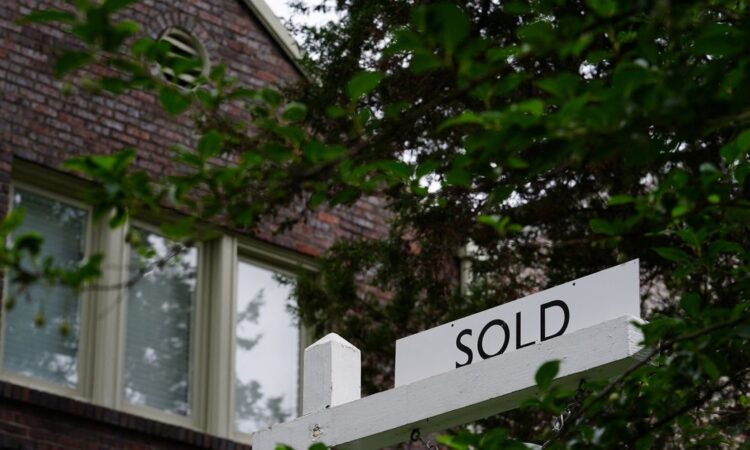
WASHINGTON, May 23 (Reuters) – Sales of new U.S. single-family homes jumped to a 13-month high in April, boosted by a persistent shortage of previously owned houses on the market and a sharp decline in prices from last year’s lofty levels.
The report from the Commerce Department on Tuesday followed on the heels of data last week showing a surge in permits for future single-family housing construction. With confidence among homebuilders rising to a 10-month high in May, there are no signs yet that a recent tightening in credit conditions are weighing on the housing market, the sector hardest hit by the Federal Reserve’s fastest interest rate hiking cycle since the 1980s.
“The evidence continues to accumulate that the housing market may have largely adjusted to the higher level of mortgage rates but the decline in the median home price is consistent with the hypothesis that home builders may be tailoring the construction of new homes towards first-time buyers,” said Conrad DeQuadros, senior economic advisor at Brean Capital in New York.
New home sales increased 4.1% to a seasonally adjusted annual rate of 683,000 units last month, the highest level since March 2022. March’s sales pace was revised lower to 656,000 units from the previously reported 683,000.
The government revised the sales, inventory and months’ supply data going back to January 2018.
New home sales are counted at the signing of a contract, making them a leading indicator of the housing market. They, however, can be volatile on a month-to-month basis.
Economists polled by Reuters had forecast new home sales, which account for a small share of U.S. home sales, would fall to a rate of 665,000 units. Sales rebounded 11.8% on a year-on-year basis in April. The median new house price in April was $420,800, an 8.2% drop from a year ago. Home sales last month were concentrated in the $300,000 to 499,000 price range.
The inventory of existing homes remains 44% below its pre-pandemic levels, according to data from the National Association of Realtors, which also last week reported price rises in roughly half of the country, multiple offers and many homes being sold above list price.
The shortage is pushing buyers keen to take advantage of dips in mortgage rates, keeping builders busy even as the overall housing market remains depressed.
The government reported last week that single-family building permits increased to a seven-month high in April.
The average rate on the popular 30-year fixed mortgage has been hovering in the middle of its 6.09% to 6.73% range this year, after peaking at 7.03% in late 2022, according to data from mortgage finance agency Freddie Mac.
New home sales increased last month in the Midwest and South regions, but dropped in the Northeast and West.
There were 433,000 new homes on the market at the end of last month, up from 432,000 in March. At April’s sales pace it would take 7.6 months to clear the supply of houses on the market, down from 7.9 months in March.
U.S. stocks were trading lower. The dollar rose against a basket of currencies. U.S. Treasury prices fell.
SPRING REVIVAL
The report added to labor market resilience, strong retail sales as well as a rebound in production at factories in suggesting that the economy regained momentum early in the second quarter.
That view was underscored by a survey from S&P Global on Tuesday showing its flash U.S. Composite PMI Output Index, which tracks the manufacturing and services sectors, climbed to a reading of 54.5 this month. That was the highest level since April 2022 and followed a final reading of 53.4 in April.
It was the fourth straight month that the PMI remained above 50, indicating growth in the private sector.
Following last week’s upbeat reports, the Atlanta Federal Reserve raised its second-quarter gross domestic product growth estimate to a 2.9% annualized rate from a 2.6% pace. The economy grew at a 1.1% rate in the first quarter.
Most economists expect a recession in the second half of this year, citing the 500 basis points worth of interest rate increases from the Fed since March 2022. Tightening credit conditions and a stand-off over raising the federal government’s borrowing cap have also raised the risks of a downturn.
The survey’s measure of new orders received by private businesses jumped to 54.3 this month, the highest reading since last May, from 51.9 in April. The services sector drove the increase, keeping services inflation elevated. A measure of prices paid by factories for inputs fell below 50 for the first time in three years. The survey’s gauge of prices paid by businesses for inputs slipped to 58.5 from 61.2 in April.
Businesses also increased headcount, with companies reporting that vacancies were being more easily filled.
Reporting by Lucia Mutikani; Editing by Paul Simao
Our Standards: The Thomson Reuters Trust Principles.




